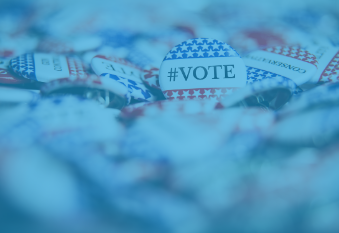Ask the Experts
Promoting Democracy in Election Season
How can college campuses institutionalize programs that transcend voting and cultivate a healthier democracy, especially during the upcoming election season?
 Alexander Edgar, UC Berkeley Vote Coalition Director; Undergrad Student, UC Berkeley (’25)
Alexander Edgar, UC Berkeley Vote Coalition Director; Undergrad Student, UC Berkeley (’25)
The first question every college should ask when starting a civic program is, “Are student leaders involved at every step of the institutionalization process?” The reason for this question is simple: students understand their peers much better than the older generations, who often make up campus leadership teams. Students are all on the same social media platforms, interacting with the same content, and learning about the same current events from a wide range of sources. We better understand which programs and platforms our peers will be most receptive to and, as a result, can play an essential role in ensuring new programs succeed when given the opportunity. In practice, this means colleges can create student advisory boards for new civic programs, collaborate with campus civic organizations, and reach out to students for feedback to ensure projects are student-centered.
Once faculty, administrators, and other campus partners have empowered students to play an active role in civic projects, institutionalizing the democratic spirit becomes a much easier endeavor. When applying students’ valuable perspectives, school-wide coalitions can work together to create a culture that engages in respectful political discourse and minimizes the polarization of democratic processes. Every campus will require different programs based on its student body’s unique needs. However, through student leadership and collaboration, every campus has the ability to dramatically raise voter turnout and registration and cultivate an enduring culture of impassioned civic engagement.
 Brian Hughes, Co-founder and Associate Director, Polarization and Extremism Research and Innovation Lab (PERIL); Research Assistant Professor, Program of Justice, Law, and Criminology, American University
Brian Hughes, Co-founder and Associate Director, Polarization and Extremism Research and Innovation Lab (PERIL); Research Assistant Professor, Program of Justice, Law, and Criminology, American University
In the leadup to American midterm elections, and the eventual 2024 presidential race, colleges and universities would do well to invest in initiatives that strengthen community resilience against the polarization and political hostility we will inevitably see. One approach can be found in the practice of attitudinal inoculation. Inoculation is a hybrid of media literacy and counterpropaganda. It is a process of educating people in the manipulative tactics and strategies which bad actors use to spread disinformation, division, and hate. Attitudinal inoculation programs are ideologically neutral because they focus on manipulative persuasive methods rather than the content. This avoids the risk of political bias, and it avoids “trend chasing” the constant evolution of extremist ideology, conspiracy theory culture, and the social media rumor mill. Instead, students are taught how to spot tactics like fearmongering, scapegoating, conspiratorial orchestration, and “with us or against us” ultimatums. They can be taught how to spot the use of Hollywood tricks, such as nauseating colors, horror movie cinematography, or unsettling sound cues, which make up a large part of multimedia propaganda and disinformation. They should be taught to spot the “brave truthteller” fallacy, very common with campus provocateurs, demagogues who claim to be speaking forbidden truths despite grave personal risk.
Attitudinal inoculation enjoys decades of empirical research confirming its efficacy, dating back to the work of William McGuire in 1961. Inoculation has been shown time and again to reduce sympathy for manipulative propaganda, willingness to support its proponents, and reduce gratification from viewing propaganda. It has been demonstrated effective in fields ranging from public health to advertising, and more recently against extremist narratives and rhetoric. Institutes of higher education can help to prevent election year turmoil by utilizing this simple, proven-effective tactic.
 Nancy Thomas, Director, Institute for Democracy & Higher Education, Tufts University
Nancy Thomas, Director, Institute for Democracy & Higher Education, Tufts University
National Advisory Board, UC National Center for Free Speech and Civic Engagement
IDHE may be best known for our National Study of Learning, Voting and Engagement (NSLVE), the standard-bearer for measuring student voting rates at U.S. colleges and universities. We do not view voting as the end goal; instead, elections present the proverbial teachable moment to educate for a more aspirational form of democracy, one that is participatory, informed, inclusive, equitable, and just. We need to educate for a democracy that is resilient to threats of disinformation, extremism, and authoritarianism, that ensures electoral access and integrity, and that addresses historic and contemporary racial inequality and inaccessible and unjust social, political, and economic systems.
Studying “what works” in creating campus environments conducive to political learning and engagement in democracy is another focus area of IDHE’s. This research has been widely reported under the rubric of Politics 365; our recommendations are published in our Election Imperatives series.
For the upcoming midterm election, I highlight three priorities for institutional leaders, faculty, staff, and students:
First, help students overcome barriers such as new or confusing registration and voting laws and ensure that eligible and registered students vote. In 2018, only 55% of registered student voters on NSLVE campuses followed through and voted. Design this priority as a leadership opportunity for student leaders, organizers, and activists.
Second, discuss democratic ideals. View democracy as both a system of governance and a culture, how people interact and solve social problems together. Americans do not seem to agree on basic tenets of democratic culture: principles and practices of fairness, inclusion, truth, equal opportunity, the just application of laws, open-mindedness, decency, and a sense of shared responsibility for each other’s well-being and future. Help students understand that their vote both reflects and shapes democratic culture.
Third, stand for academic freedom. Legislative efforts to curtail teaching that is “divisive” or to revise history around race in the U.S., as well as so-called “free speech” laws, have a chilling effect on political discussion and learning. To defend academic freedom, institutions need to affirm higher education’s purpose as the nation’s think tank in critiquing and recreating democracy.
 Dawn Whitehead, Vice President, Office of Global Citizenship for Campus, Community, and Careers, American Association of Colleges and Universities (AAC&U)
Dawn Whitehead, Vice President, Office of Global Citizenship for Campus, Community, and Careers, American Association of Colleges and Universities (AAC&U)
When institutions reference democracy and/or service to society in their mission statements and learning outcomes, it sends a message that there is a case to be made for institutionalizing civic skills that transcend voting and prepare students to be active participants in a healthy democracy. If we push it, we could argue that it also indicates that higher education has a role to play in continuing to cultivate a healthy democracy. The words alone aren’t enough. Institutions must be intentional about integrating civic skills into curricular and co-curricular initiatives as part of the broader institutional culture that touches all students.
The key to unlocking civic learning skills is greater integration of learning that occurs inside and outside the formal classroom. Campus and community educators can help students make key connections between these two worlds guided by identified civic skills. With intentional integration of discipline-specific examples of civic learning in classes, students can explore their role as budding professionals while also making connections to their own understanding and experiences about their roles as active participants in society for the greater good. In their applied experiences, they should have opportunities to collaborate across differences, listen, reflect, and learn to build consensus around civic issues. When students are guided through the integration of their academic and applied learning and then encouraged to make connections to their self-reflection, they will have a much broader understanding of democratic and civic purposes that go well beyond voting.


